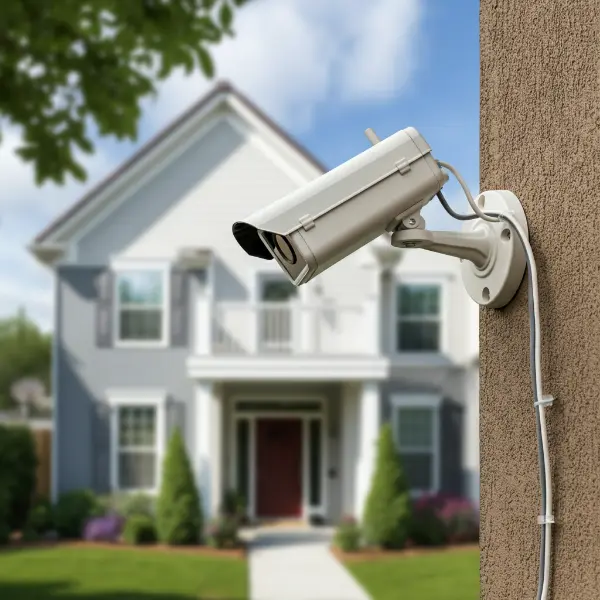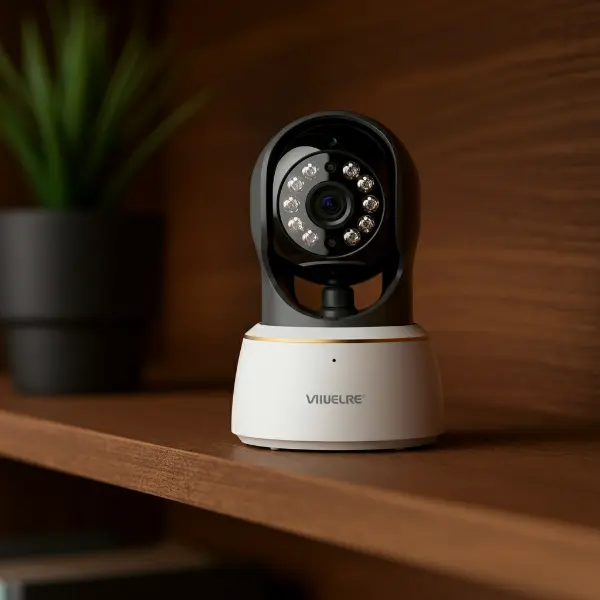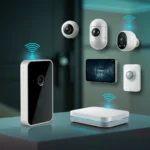Security is an essential concern for any home or business owner. With the rise of smart home security, choosing between wired vs. wireless smart security cameras has become a critical decision for anyone aiming to protect their property. Each option comes with its own set of features, advantages, and limitations. This article takes a deep dive into comparing these two types of cameras, covering everything from the installation of security cameras to the cost of security cameras, and will help you make an informed decision.
Whether you’re upgrading your home surveillance system or installing cameras for the first time, this guide has got you covered.
The Basics of Smart Security Cameras
What Are Wired Smart Security Cameras?
Wired security cameras are connected directly to a power source and recording system, using cables to transmit footage. Think of these cameras as the “traditional” option for setting up a robust security system. Many rely on Power over Ethernet (PoE) cables, which eliminate the need for a separate power source. These cameras often integrate into a broader home surveillance system for continuous monitoring.

Wired Security Camera Benefits
- Reliable connection since they don’t rely on internet signals.
- Superior video quality, with little to no compression or downtime.
- More resistant to data privacy concerns, as footage typically remains within a closed circuit.
However, installation can be tricky, requiring trained professionals in many cases, which adds to the cost of security cameras.
What Are Wireless Smart Security Cameras?
On the flip side, wireless security cameras (or, more accurately, Wi-Fi security cameras) transmit data through a wireless network. These cameras can either be plugged in for power or operate as battery-powered cameras, offering great flexibility.

Wireless Security Camera Advantages
- Easy installation since there are no cables to hide or lay across the property.
- Highly flexible—great for both outdoor security cameras and indoor security cameras.
- Enable remote monitoring, allowing users to check their cameras from anywhere via an app.
The reliance on Wi-Fi and batteries does make these cameras dependent on internet reliability and regular battery maintenance.
Wired vs. Wireless Cameras: Key Differences
1. Installation
Wired cameras require extensive setup. Picture this scenario—John, a small business owner, wanted to secure his café with motion detection cameras. He opted for wired cameras, but the installation process included drilling holes, running cables through ceilings, and hiring professionals. The process was both time-consuming and costly.
Alternatively, Sarah, a recent homeowner, bought a few battery-powered cameras for her backyard. Within hours, she had her outdoor security cameras running, with no need for help. Wireless security camera installation is often a simple DIY project!
2. Power Supply for Cameras
- Wired Cameras: Depend on a continuous power source, providing uninterrupted recording and great for 24/7 surveillance.
- Wireless Cameras: Offer flexible power supply options, such as rechargeable batteries or even solar-powered solutions.
That said, if the power goes out, wired cameras with no backup might stop working. On the other hand, Sarah’s battery-powered cameras kept recording during a temporary power outage, as they didn’t rely on the electrical grid.
3. Video Quality of Security Cameras
Wired security cameras often produce higher-quality video, especially models designed to record large amounts of footage. Wireless cameras can also deliver clear visuals, but their quality may dip if the Wi-Fi connection is unstable.
If you’re serious about getting the best night vision cameras or high-resolution cameras, it’s worth exploring both types to match your requirements.
4. Remote Monitoring
Wireless cameras excel in providing quick access to live footage on your phone or tablet. Using smart camera features, you can receive alerts when motion detection cameras sense movement.
Wired systems are not far behind in offering such capabilities, especially if they include cloud storage for cameras. However, software integration for remote access may incur extra costs.
5. Maintenance Needs
Security camera maintenance is another critical factor:
- Wired cameras require little upkeep but may need professional servicing if hardware issues arise.
- Wireless security cameras, especially battery-powered cameras, will need regular battery replacements or recharges, and you’ll need to monitor their Wi-Fi connection health.
Best for a Permanent Setup
For businesses or large homes, wired security cameras might be the better choice due to their stability and ability to capture high-quality footage 24/7. Investing in indoor security cameras for offices or wired cameras with night vision for warehouses makes them an ideal pick for these environments.
Best for Flexibility
For renters, small homeowners, or anyone focused on cost-effective security, wireless security cameras are a win. These cameras are also ideal for remote properties like farms or construction sites, as they function well without access to stable power or wired internet.
Step-by-Step Guide to Choosing the Right Camera
Here’s how you can decide between the two:
Step 1 – Assess Your Property
Large properties with multiple blind spots may benefit from a wired system, whereas smaller homes might find wireless cameras sufficient.
Step 2 – Identify Your Connectivity Needs
- Have strong, reliable internet? Consider Wi-Fi security cameras.
- Prefer no interruptions? Opt for wired cameras.
Step 3 – Consider Your Budget
Factor in the cost of security cameras and installation. While wireless cameras are generally cheaper upfront, ongoing battery maintenance can add up.
Step 4 – Look at Extra Features
Do you need two-way audio cameras to interact with visitors? What about motion detection cameras or cloud storage for cameras for extra convenience? Tailor the features to suit your daily needs.
Step 5 – Read Reviews
Before purchasing, check out product reviews to identify the best options. Whether it’s the video quality of security cameras or ease of use, real experiences matter.
Addressing Data Privacy Concerns
Data privacy concerns are valid when it comes to Wi-Fi security cameras. Wireless networks are inherently vulnerable, so make sure to:
- Use strong, unique passwords.
- Enable encryption and two-factor authentication.
- Keep firmware updated to reduce the risks.
Wired cameras are less prone to hacking since they transmit data directly over physical cables.
FAQs
1. Are wired security cameras better than wireless?
Wired cameras tend to be more reliable and provide higher video quality, making them ideal for permanent setups. Wireless cameras, on the other hand, offer flexibility and ease of use.
2. Which type of camera has better video quality?
Both can have excellent quality, but wired cameras generally yield the best, uninterrupted video resolution as they’re not affected by Wi-Fi speeds.
3. Are wireless cameras more prone to hacking?
Yes, wireless security cameras rely on internet connectivity, which can make them vulnerable. Taking proper steps, like setting strong passwords, can reduce hacking risks.
4. Can wireless cameras work during power outages?
If battery-powered cameras are used, they’ll continue to work during outages. Wired cameras will require a power backup such as a UPS.
5. What’s the life span of batteries in wireless cameras?
Battery life can vary greatly. Some wireless cameras last up to six months, while others may need recharging every 1-2 months.
6. Can I mix wired and wireless cameras in the same setup?
Absolutely! Many users combine both for a hybrid security system, balancing reliability and flexibility.
7. How much do security cameras cost?
The cost of security cameras depends on brand, features, and installation. Wired systems can cost upwards of $2,000 for four cameras, while wireless options can start as low as $100 per camera.
Final Thoughts
Deciding between wired vs. wireless smart security cameras boils down to your specific needs. If you value reliability and high-quality footage for long-term use, wired options are your best bet. For anyone looking for flexible, easy-to-install alternatives, wireless security camera advantages are hard to ignore. Carefully weigh the pros and cons, and you’ll find a solution that ensures peace of mind for your home or business.
Time to make your choice! Protect your loved ones and property confidently—your smart surveillance system awaits!



